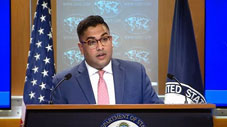
US Deputy Spokesperson Emphasizes Continued Engagement with Georgian Officials
By Liza Mchedlidze
Wednesday, July 3, 2024
The United States remains committed to engaging with Georgian officials despite recent legislative concerns, Deputy Spokesperson for the US Department of State, Vedant Patel, stated during a press briefing.
Responding to a question about the visits of Georgian officials to the US, Patel emphasized the importance of maintaining a constructive bilateral relationship with Georgia.
"When it comes to Georgia - and I know we've spent a lot of time in this briefing room talking about some of the legislation that has recently passed - it's important that also we continue to engage with appropriate officials when the Georgian Government - it is a country we continue to have a range of issues that we want to prioritize in the context of that bilateral relationship with them," said Patel.
Patel acknowledged the US's concerns over recently adopted "Foreign Agents" legislation, which has been viewed as counter to Georgia's aspirations to join the European Union. However, he stressed that ongoing dialogue is essential to address various bilateral issues.
"And while, of course, when it has come to this specific legislation, you've heard me and Matt talk about the many issues that we have and how we believe it is counter to Georgia's own EU aspirations. It's - we still believe it's important to engage, and there continue to be other issues that we have no doubt we'll talk about with them," Patel added.
Earlier, Secretary of State Anthony Blinken stated that Washington had clearly expressed its position regarding the adoption of the law and had taken measures accordingly. "We will probably see more," Blinken noted.
In response to the adoption of the "Foreign Agents" law, the State Department announced the first package of sanctions on June 6. The sanctions involve visa restrictions affecting members of Georgian Dream, members of parliament, security forces, and private individuals. In total, up to 30 people are impacted.
Matthew Miller, a spokesperson for the State Department, did not specify individuals or names, citing immigration law restrictions that prevent the release of names.

